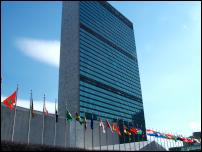UN Conundrum Over 92 Fiji Soldiers For Operation
UN Conundrum Over 92 More Fiji Soldiers For North Africa Peacekeeping Op
Scoop In New York: SPECIAL ASSIGNMENT
 Fiji's announcement that 92 soldiers from its army will
be deployed to Sinai and Sudan has caused a flurry of
activity at the United Nations in New York. But where
exactly does the UN stand on post-coup Fiji? - Selwyn
Manning reports from New York.
Fiji's announcement that 92 soldiers from its army will
be deployed to Sinai and Sudan has caused a flurry of
activity at the United Nations in New York. But where
exactly does the UN stand on post-coup Fiji? - Selwyn
Manning reports from New York.
The United Nations secretary general's office here New York was caught off-guard on hearing Fiji's Military had announced 92 soldiers more soldiers will soon be deployed to UN peacekeeping operations in Northern Africa - the bulk of these will go to Sinai, and the remaining six to Sudan.
The UN secretary general's spokesperson was asked on Friday (New York time) to clarify the UN's position on Fiji – considering the Pacific Island nation's military overthrew its government in December 2006. Former secretary general Kofi Annan had said at the time that there would be consequences for Fiji's military should it go ahead with a coup.
Newly appointed secretary general Ban Ki-moon's office sought time to clarify the announcement, later stating that no new deployment (with respect to Fiji) had taken place since the 2006 coup.
However the UN boss' office did not state that the report was incorrect. Neither did it specify whether a decision to deploy the 92 Fijian soldiers was already 'in the pipeline' prior to the December 2006 military coup.
But detail of the deployment - as released by the Fijian Military and published Friday on FijiLive.com - was specific. Fiji's Military spokesman Major Neumi Leweni said the first group to Sudan will consist of 42 soldiers and will leave on March 2 and the second group will leave at a later date.
Leweni told FijiLive the dates were not confirmed for the remaining six who are destined for the Sudan operation. The military spokesperson also told FijiLive Captain Penioni Naliva - the private secretary for Fiji's military Commander Commodore Voreqe Bainimarama - will lead the Sudan mission.
The New Zealand government mission here at the United Nations has been applying pressure on the Secretary General's office to remain staunch against Fiji – at least until democracy is restored to the Pacific nation.
New Zealand was influential in shaping former secretary general, Kofi Annan's position in December when he warned there would be consequences should Fiji's military overthrow the elected Qarase multiparty government.
Annan warned that Fiji’s international standing, especially as a contributor to UN peacekeeping missions, could be jeopardized should the military conduct a coup.
That statement was interpreted as meaning the UN would cut ties with Fiji, canceling its contribution of soldiers to peacekeeping operations.
Immediately prior to the December coup, Annan’s spokesperson said soldiers who take part in a coup d’etat, an unlawful seizure of power, would most likely be unwelcome in UN missions. Fiji at that time had 275 troops serving in UN peacekeeping operations.
Days earlier Annan emphasized that “Fiji’s international standing, which it has built carefully over the years, as an important contributor to UN peacekeeping operations and more recently as a member of the Peacebuilding Commission,” was at risk if the crisis was prolonged.
On January 8 the newly appointed Ban Ki-moon repeated Annan's call for the reinstatement of Fiji’s ‘legitimate authority’.
On hearing from Scoop that Fiji had announced a renewed deployment of soldiers, New Zealand foreign affairs officials immediately sought clarification from the secretary general's office.
But difficulty remains, for all concerned, in determining exactly where the UN stands on post-coup Fiji.
A UN official, close to the security council, told Scoop on Friday evening (New York time) that the security council considers the 2006 Fiji coup as almost irrelevant – it is far away from New York and the coup hardly registers on the security council's radar, he said.
Clearly, the security council is more interested in keeping contributing nations on side. To ban Fiji from contributing soldiers to peacekeeping operations would go against the security council's needs, he said. And considering there will be a 30-40 percent increase in UN led operations in 2007 – the security council needs all the soldiers it can get.
Back to Top or Back to New York Assignment Feature Page…
![]() Selwyn Manning is on assignment
in New York, his accommodation is courtesy of Wotif.com
and Signature Properties, New York.
He will be reporting daily on events in the Big Apple,
including a United Nations session on
peacekeeping/peace-building, and international
affairs.
Selwyn Manning is on assignment
in New York, his accommodation is courtesy of Wotif.com
and Signature Properties, New York.
He will be reporting daily on events in the Big Apple,
including a United Nations session on
peacekeeping/peace-building, and international
affairs.


 Eugene Doyle: The West’s War On Iran
Eugene Doyle: The West’s War On Iran Richard S. Ehrlich: Deadly Border Feud Between Thailand & Cambodia
Richard S. Ehrlich: Deadly Border Feud Between Thailand & Cambodia Gordon Campbell: On Free Speech And Anti-Semitism
Gordon Campbell: On Free Speech And Anti-Semitism Ian Powell: The Disgrace Of The Hospice Care Funding Scandal
Ian Powell: The Disgrace Of The Hospice Care Funding Scandal Binoy Kampmark: Catching Israel Out - Gaza And The Madleen “Selfie” Protest
Binoy Kampmark: Catching Israel Out - Gaza And The Madleen “Selfie” Protest Ramzy Baroud: Gaza's 'Humanitarian' Façade - A Deceptive Ploy Unravels
Ramzy Baroud: Gaza's 'Humanitarian' Façade - A Deceptive Ploy Unravels